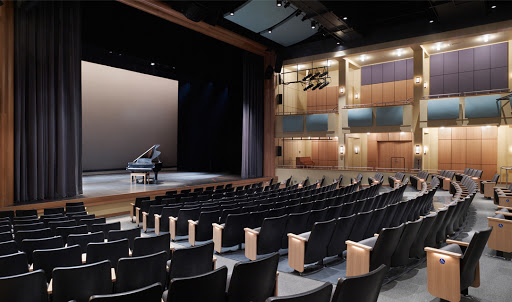Eshika Tangri ‘23
Theater for Change, taught by theater department member Kelly Bertucci, will be a new course offered in the 2021-22 academic year and will focus on a variety of theatre-related topics in the context of society. According to Bertucci, “This new class is looking at art, specifically theatre, and the role it can play as an agent of change.” To do this, “Theatre for Change” will give students the space to look at other cultures, histories and experiences. Bertucci adds, “We will also do our own identity work and reflect on the stories and art we consume as part of our daily lives. We will use theatre as a vehicle to examine ways in which it allows audiences to engage with identity, race, society and power.”

There are a number of different units that Bertucci plans to examine throughout the course. Some examples of themes and identities that will be covered are racial justice, BIPOC, Asian Americanism, Mexican Americanism, LGBTQ+, Ability, and Indiginism, all of which will be explored in the context of representation in theatre. Bertucci will pose questions such as “Why do we see and hear the stories we do, why not others?”, “How do we interact with the material we engage with?” and “Why do theatre artists use this medium to tell stories for voices that often go unheard?” With the perspective gained by examining different shows, students will create a final project in which they tell their story, one that they want to tell and the community as a whole needs to hear. Alaina Guo ‘22, a Domino Board member, believes, “‘Theatre for Change’ is an important class to offer because it looks at why art is important and how we can express things we care about.”
As a teacher, Bertucci has a few goals in mind for her students taking this course. “I want to challenge students to engage with their own identities and their social groups, develop a sense of community and cultural competency rooted in finding commonalities and promoting curiosity, and learn more about their own and other’s cultures.” “Theatre for Change” aims to contextualize the role of the theatre in creating change and past movements, allowing students to engage in anti-racist discussions about systemic oppression. “I hope they get a sense of how art influences their identities and how they view other people’s identities,” states Bertucci.
The class is open to all students, regardless of their theater experience. Bertucci says, “There will be a blend of approaches to the class. We will be laying a foundation for the semester together collaboratively at the beginning of the class. As we move into playwrights and plays, there will be some work we will do as a class and then students will be able to choose from a list of plays and playwrights to continue their work. I want students to be able to have some autonomy in the material they engage with as part of this class.” Rachel Letts ‘22 echoes this mentality, saying, “The theater department always works to create a safe and welcoming environment for the whole EA community while challenging our creativity and artistic skill.”
“Theatre for Change” will be a space to engage in the artform of theatre while examining stories through a critical lense. “Using theatre as a guide, we will examine our own and others’ cultures, histories and experiences. Taking journeys to other times and places, we will discuss the way in which theatre allows the audience to engage with complex feelings about identity, race, society and power,” summarizes Bertucci.
“Theater for Change” is a semester course that would fulfill part of the Arts requirement, and any interested students should reach out to their form dean to add it to their schedule next year.